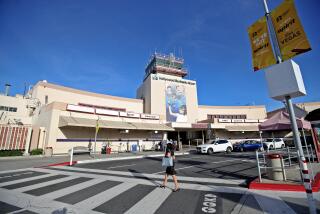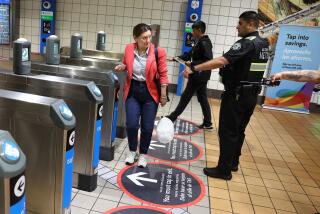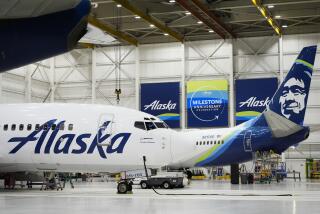Your boarding pass does contain information about you, but whether it can be used for evil is another question
What does your boarding pass say about you? Enough to stop me from wadding it up and throwing it in the trash as I used to do. Thanks to help from Brett Snyder, president of CrankyFlier.com, which deals with all manner of airline questions, and CrankyConcierge.com, which offers air travel assistance, emergency or preventive, here’s what I’ve learned about an old boarding pass that was curled up on my desk unattended and ripe for prying eyes.
You read from time to time that paper boarding passes contain lots of secret information. There is information, but, Snyder said, not top-secret stuff.
“Most of this information on its own is not something that will do damage,” said Snyder, whose résumé includes stints working for various airlines, including United.
The paper (I’m a sucker for paper) boarding pass in question was for a late September flight to from Washington Dulles to LAX. Here’s what it revealed and whether that’s a problem. It says:
--I have TSA PreCheck, no problem. It’s hardly a secret because anyone could figure that out when I moved to the PreCheck line that gets any holder through security faster. It’s available through the Transportation Security Administration for $85 for five years or through Customs and Border Protection as part of its Global Entry program that also speeds you through Customs reentry for $100 for five years. (I have the latter. The Times does not pay for this for me; I like it so well that I have gifted several family members with it.)
--My name, which is so long it doesn’t all fit; no problem. (It’s that darn middle name. Thanks a lot, Mom.)
--That I was flying from Dulles to LAX; no problem.
--That my gate was D26; no problem, especially because I didn’t get on the wrong Dulles train this time to get to D26 as I did in June. (Because I have the directional nitwit gene, I always build in extra time.)
--That boarding would begin at 6:20 a.m. and that departure was at 6:40, no problem. The problem was not that it was on my boarding pass but that the flight was more than an hour late, which made me late for work.
--That I was sitting in Seat 3A; not a problem, except maybe one of perception. I believe that a first-class upgrade from accumulated miles is one of the best bargains around.
I’ve stopped hoarding miles and instead, for an early morning or overnight transcontinental flight, I allow myself to fork over 20,000 miles and $75 for a first-class seat if I’m on United. (It’s 15,000 miles plus $75 on American.) You usually get to board earlier, you get breakfast on those pre-dawn flights, you can stretch out and your checked bag often comes out faster.
In my case, this was a one-way ticket (it was a multicity itinerary) that cost $148, so even with the $75, it was still a bargain. (The Times did not and does not pay for upgrades.)
--My confirmation number; maybe a problem. If someone had my boarding pass with my confirmation number and my name it could have opened the way for some tampering with my reservation, Snyder said.
The flight number was there; my name was there; my confirmation number was there. Or if you have, heaven forbid, a stalker, they’ll know where you are.
Again, not likely scenarios, but a reason to treat your boarding pass as you would, say, a credit card you’re using by keeping its number covered up and by not flashing it around.
Who flashes around such stuff? Many people do, Snyder said — on social media. It is never a good idea to post your boarding pass online, he said, just for your safety and security.
And when you’re done with your boarding pass? Put it in the shredder just as you would a credit card bill.
I am taking that advice to heart especially because of the bar code on my ticket.
There are websites that will allow you to upload that barcode and decode it for you. I found one through the Krebs on Security website (lat.ms/krebsonsecurity) and used it to see what that barcode revealed.
Most of what I found was the same information that’s on my boarding pass (although it also showed my original seat number) except for one thing: My frequent-flier number was contained therein.
This also isn’t a problem, for the most part, because you would need a password to get into that account. If you have a weak password, such as 12345, someone could get to your account and perhaps help himself or herself, Snyder said.
But, he noted, United has recently toughened its password requirements. Other airlines, he said, may not be quite as stringent and that could be a problem if the passenger or the airline is lax.
Also, wrote Brian Krebs, author of the blog Krebs on Security, it could be possible to see future flights tied to that number.
But, he noted, “United Airlines seems to treat its customers’ frequent-flier numbers as secret access codes. For example, if you’re looking for your United Mileage Plus number, and you don’t have the original document or member card they mailed to you, good luck finding this information in your email correspondence with the company.
“When United does include this code in correspondence, all but the last three characters are replaced with asterisks. The same is true with United’s boarding passes.”
My account shows no future travel, says my mileage balance is good for about one more upgrade and maybe a super-low awards ticket to Allentown, Pa., and that I’m miles, literally and figuratively, from elite status, which clearly isn’t happening this year or any other year because fare tops loyalty for me every time.
But I am better informed about what this information is or how it could be used, and for this I am grateful. In fact, that’s why you’re not seeing a picture of my boarding pass with this column and why, if you listen carefully, that whirring sound you hear is my shredder, my new BFF.
Have a travel question or dilemma? Write to [email protected]. We regret we cannot answer every inquiry.
More to Read
Sign up for The Wild
We’ll help you find the best places to hike, bike and run, as well as the perfect silent spots for meditation and yoga.
You may occasionally receive promotional content from the Los Angeles Times.







